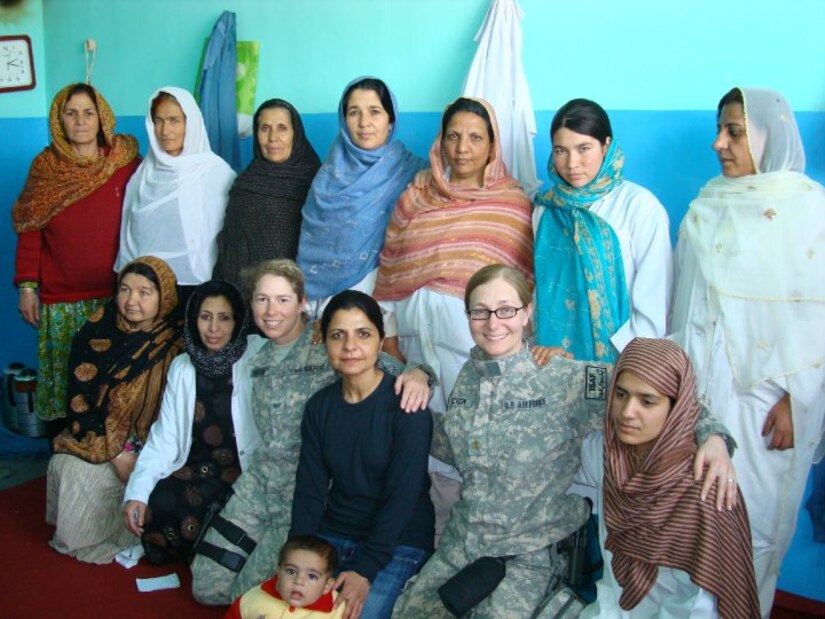FALLS CHURCH, Va. -- Air Force Lt. Col. (Dr.) Elizabeth
Erickson’s experiences in military health outreach around the world allows her
to build strong partnerships, and her position as a female officer and
physician has given her the unique opportunity to work with and learn from
inspiring women around the globe.
The Air Force Medical Service participates in international
medical outreach efforts, called global health engagements, to strengthen
relationships with partner nations that bear fruit diplomatically and
medically.
Building Strong Relationships With Allies, Partners
GHEs include a broad range of international medical
activities undertaken by the U.S. military. These activities help to build
strong relationships with allies and partners, increase military medical
interoperability between nations and build global capacity to address health
security threats.
“For example, we work with some partner nations on
biosurveillance in order to better detect and respond to outbreaks, so they do
not become larger health security crises,” Erickson said.
Erickson, a family physician and currently a preventive
medicine resident at the Uniformed Services University of the Health Sciences
in Bethesda, Maryland, always had an interest in working and studying abroad.
Before joining the Air Force, she studied and volunteered in India and Africa.
In the Air Force, after assignments in Turkey and Germany
and a deployment to Afghanistan, she was an international health specialist at
Pacific Air Forces and U.S. Pacific Command.
“I was always interested in having a global perspective on
care, so I gravitated towards these unique opportunities,” Erickson said. “As
an international health specialist, I planned and executed GHEs, coordinated
Department of Defense health activities across the Indo-Asia-Pacific region,
and developed strategies to use health engagements to achieve national security
objectives.”
Service in Afghanistan
Erickson’s GHE experiences allow her to apply and expand
intercultural, medical and military skills. As a female officer, she had
opportunities to support the health and empowerment of women in multiple
countries, specifically in Afghanistan.
From July 2009 to March 2010, Erickson served as senior
medical officer and director of Women’s Affairs on the Zabul Provincial
Reconstruction Team in Afghanistan. She and her team executed programs that
supported the local government and improved the health and well-being of the
local population, especially women and children. The team engaged with the
local Ministry for Women’s Affairs representatives, female health care
providers at local hospitals and the province’s only girls’ school.
“It was a priority for our commander to find sustainable
ways to improve the lives of Afghan women,” Erickson said. “One project
provided women with solar stoves. We found that women were inhaling harmful
smoke while cooking with charcoal and wood, and we wanted to provide an
alternative cooking method that would ultimately improve their health.”
The three medical Air Force women on the PRT met regularly
with local female health care providers.
“We developed strong relationships with them and learned
about their challenges,” Erickson said. “We conducted training on basic life
support in obstetrics to help them recognize potentially life-threatening
events that happen during childbirth and prepared them to manage those events.”
International Women’s Day Event
While in Afghanistan, Erickson participated in an
International Women’s Day event. Local women -- including the female nurses and
physicians she had worked with so closely -- gave speeches, performed music and
recited poetry.
“It was special to see our friends, these women we became so
close with, share their hopes for peace and stability in Afghanistan,” Erickson
said.
Erickson’s experiences serve as an important reminder that
female military leaders and medical personnel are vital for full-spectrum
global health engagement, and she encourages other female medical airmen to
pursue opportunities in GHE.
“There are some really inspiring women in our partner
nations, and it was a rewarding experience to meet and work with them,”
Erickson said. “Many times, my female counterparts and I built a special bond
and we worked together to move health cooperation between our militaries
forward.”
She added, “We should encourage more women to become leaders
on both sides of the GHE community to improve our engagements with our partner
nations and the global military medical community.”

No comments:
Post a Comment